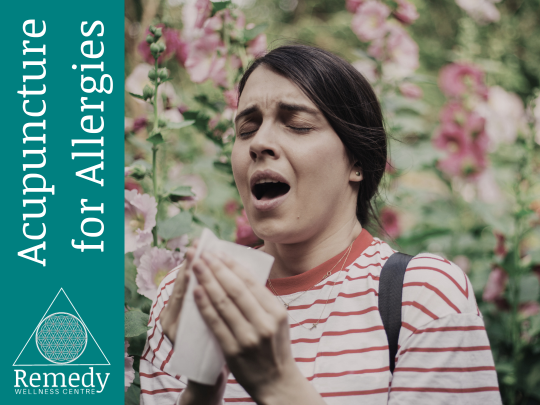Acupuncture has always been one of the most effective alternatives to managing allergies and hay fever without medication. Acupuncture for allergies is safe, effective and affordable.
Treatment of Allergies with Acupuncture and Traditional Chinese Medicine
The Acupuncture and Traditional Chinese Medicine treatment approach involves reducing inflammatory reactions and histamine release using needling, dietary modifications along with supplements and herbs. Acupuncture can help balance the immune system as well offering relief from acute symptoms such as hives/rash, sinus congestion and headaches…
Acupuncture can be used as a complementary approach to help manage allergies. It is believed that allergies are caused by an imbalance in the body’s immune system, leading to an exaggerated response to certain substances (allergens) such as pollen, dust, or pet dander. Acupuncture aims to rebalance the body’s energy and improve overall well-being, which can help alleviate allergy symptoms.
Here’s how acupuncture may help with allergies:
1. Regulating the immune system: Acupuncture is thought to help regulate the immune system, which plays a crucial role in the body’s allergic response. By stimulating specific acupuncture points, it is believed to promote a more balanced immune response and reduce the hypersensitivity to allergens.
2. Reducing inflammation: Allergies often involve inflammation in the body, leading to symptoms such as sneezing, itching, and congestion. Acupuncture has been found to have anti-inflammatory effects, which can help alleviate allergic reactions and reduce the severity of symptoms.
3. Relieving sinus congestion: Acupuncture can target points in the face and head region, which can help relieve sinus congestion and promote better drainage. This can be particularly helpful for individuals with allergic rhinitis or sinusitis.
4. Balancing energy flow: According to traditional Chinese medicine, allergies are seen as an imbalance in the body’s energy flow. By inserting needles into specific acupuncture points along the meridians (energy pathways), acupuncture aims to rebalance the flow of energy and restore overall harmony in the body.
It’s important to note that while acupuncture can provide some relief for allergy symptoms, it may not be a standalone treatment. It is often used in conjunction with other conventional approaches, such as medication or avoidance of allergens. It’s best to consult with a qualified acupuncturist or healthcare professional to determine the most appropriate treatment plan for your specific allergies.
The Top 5 Acupuncture Points for Allergies
While there are numerous acupuncture points that can be used to address allergies, here are five commonly utilized points:
1. LI4 (Hegu): Located on the back of the hand, in the webbing between the thumb and index finger, LI4 is a versatile point often used for various conditions, including allergies. It is believed to help regulate the immune system, reduce inflammation, and relieve sinus congestion.
2. LI11 (Quchi): Situated on the outer crease of the elbow, LI11 is another frequently used point for allergies. It is believed to have an anti-inflammatory effect and can help alleviate symptoms such as itching, sneezing, and nasal congestion.
3. Yintang (Extra Point): Positioned between the eyebrows, in the center of the forehead, Yintang is commonly known as the “Third Eye” point. It is often used for treating sinus congestion, headache, and stress-related symptoms associated with allergies.
4. LI20 (Yingxiang): Located on either side of the nostrils, at the level of the midpoint of the nasolabial groove, LI20 is known as the “Welcome Fragrance” point. It is frequently used to relieve nasal congestion, sneezing, and itching associated with allergic rhinitis.
5. GB20 (Fengchi): Found on the back of the neck, in the hollow between the two large muscles at the base of the skull, GB20 is a commonly used point for allergies. It is believed to help reduce inflammation, relieve sinus congestion, and alleviate headaches associated with allergic reactions.
Remember, the selection of acupuncture points may vary depending on the individual’s symptoms, constitution, and the practitioner’s assessment. It is advisable to consult with a qualified acupuncturist who can provide personalized treatment based on your specific allergies.
Book Online Today to try acupuncture for your allergies!

